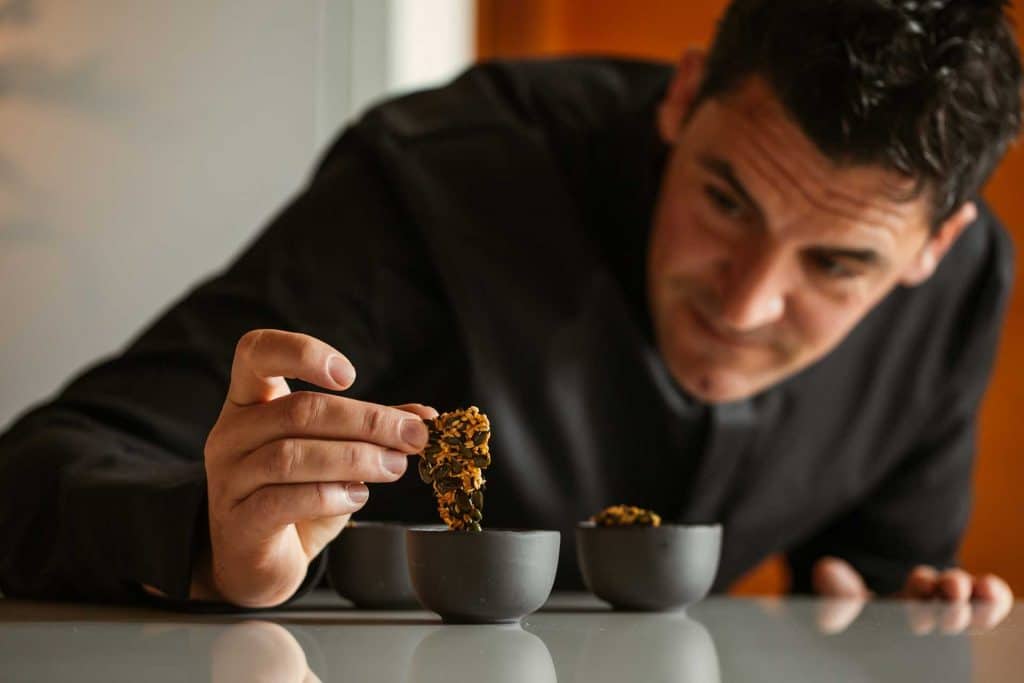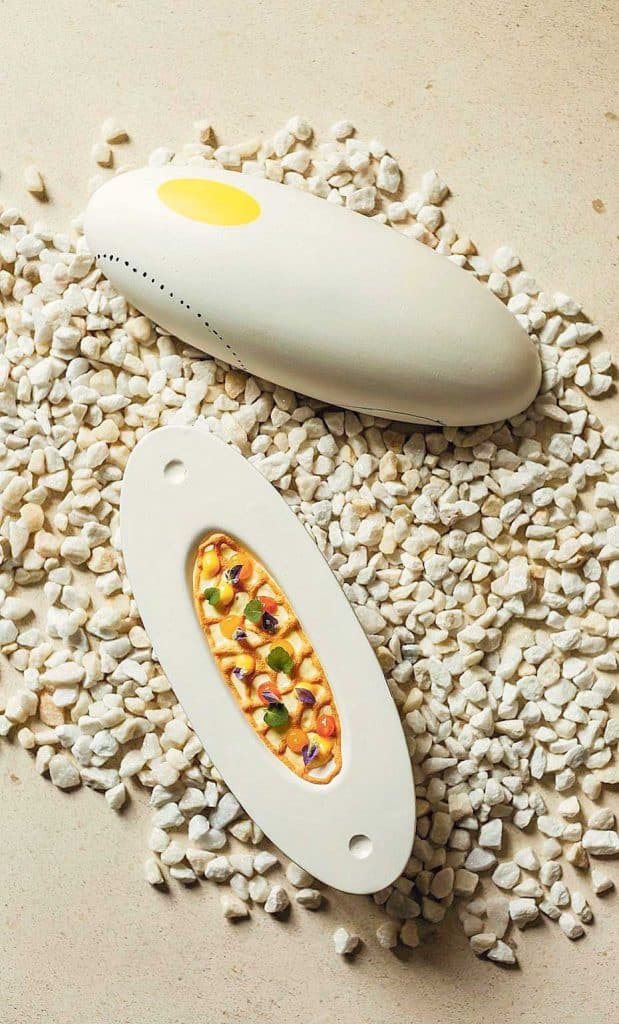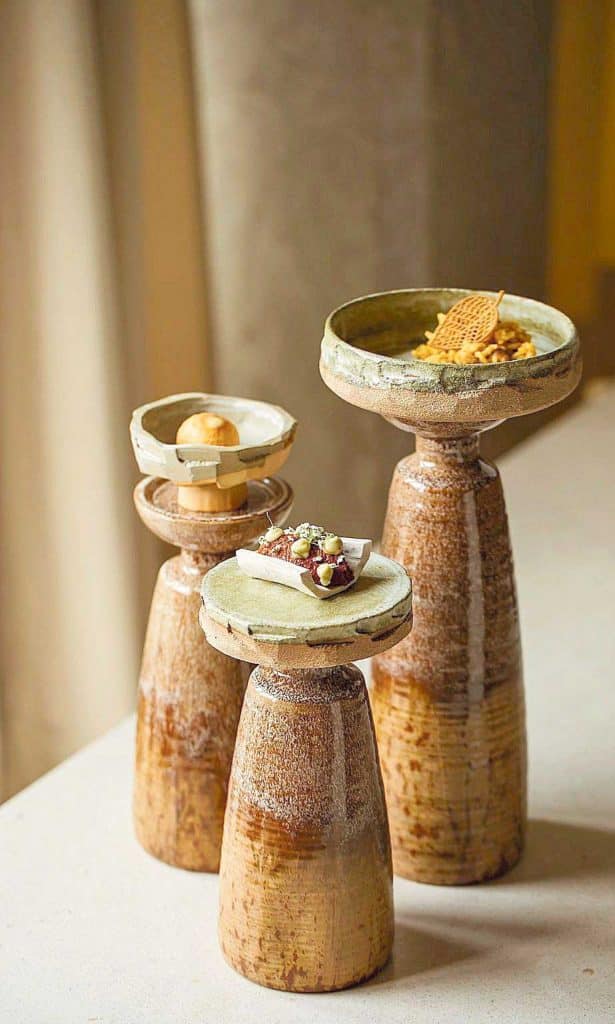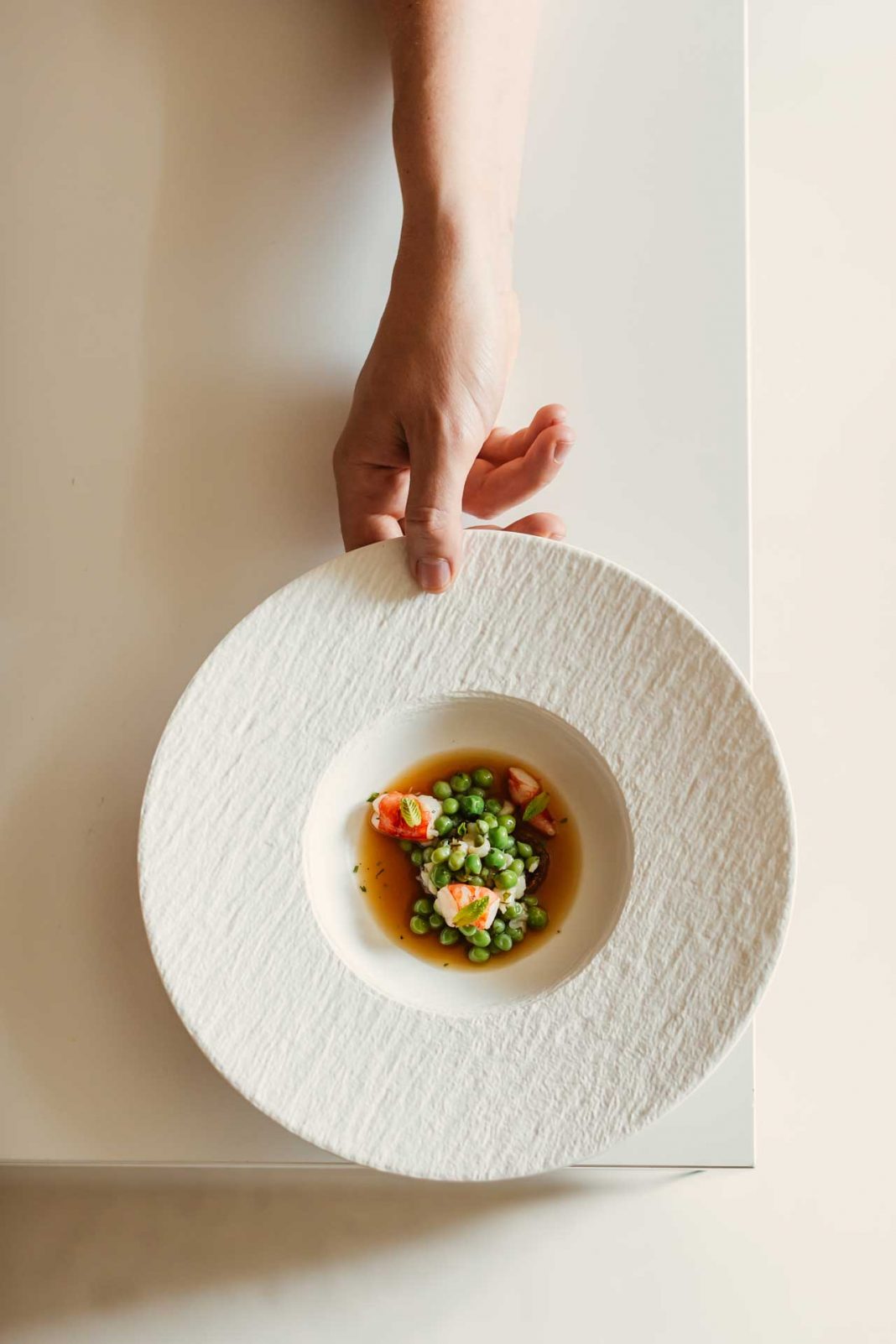Top chef Óscar Molina launched his gastronomic project at the Ibiza Gran Hotel 14 years ago. He came from outside, from Barcelona, and his relationship with the local produce started in an organic, very natural way. «Buying fruit and vegetables from the father of my son’s school friend seemed totally normal,» the chef explains. In the same way he enlisted the services of Pere Varela, from the Fishermen’s Guild of Ibiza and who he had met previously, making him into his main fish supplier.
«The zero-kilometre context is in fashion. I think it is a commercial action rather than real action in many cases, but I firmly believe in opting for locally-produced products, in giving work to your neighbour,» declares the chef. Molina says that for him, «what matters the most is people,» and he prefers to be another step in a circular economy.

You don’t need to look very far
Óscar Molina’s cuisine at La Gaia, which boasts one Michelin star and two Repsol Suns, has a very universal language, with culinary influences from Japan and Peru since the start. These characteristics meant that, at first, the chef imported certain products from other countries to achieve the desired result.
However, over time he discovered the possibilities of Ibizan products, which today are the protagonists of many of his creations, regardless of whether the Japanese and Peruvian roots are still there. «Little by little we have been substituting products we brought from overseas to products from this land,» he says.
«We’ve been substituting the products we bring in from outside for local products»
This habit of looking at far off places before one’s own is common in many restaurants, especially when they want highly desirable products. However, sometimes you only need to look around you to find options that can be even more interesting. «The king crab, for example, is an excellent and very coveted product that’s imported from Russia or Canada. But, why? We already have fantastic products here like the lobster, the langoustine or the Ibizan cigala real (a local Norway lobster). Sometimes you don’t have to look so far to find great products,» says the chef, who considers it is essential to place value on local ingredients.
«In the kitchen, everything is based on trial and error,» Óscar Molina explains. This is exactly his way to research, know and consciously use each and every one of the products he includes in his creations. «Now in our menus, we use a lot of honey, for example. The bee-keepers made me a patron of mel d’Eivissa (certified Ibizan honey), and what better way to thank them than by using their excellent product,» he adds.
«It wouldn’t make any sense to promote a product from outside of the place I’m in»
Relationship of altruism and love
Öscar Molina’s relationship with Ibiza’s small, independent producers has been very close and permanent since the start and he is grateful for their efforts in satisfying his needs at La Gaia.
He defines the links between farmers and chefs as «like a marriage: it is constant, a tug of war».
«I have needs as a restaurateur and I seek perfection. This means a great deal of effort by these collaborators,» explains the chef, who is totally convinced of the need to support small producers to ensure their economic survival.
The products from Ibiza have optimum quality to create Michelin-starred cuisine

Opting for Ibizan products has its advantages (maximum freshness, very interesting flavours and, of course, that direct contribution to the economy of the island), but also its disadvantages. «Fishing and the fields here have their limitations, they offer what they have,» says Óscar Molina, who considers that the relationship with the island’s farmers is a blend of «altruism and love».
Because, while it is true that you could buy the fresh ingredients you use in the restaurant from producers outside the island, it would not fit your understanding of cooking, in particular, and life in general. «It wouldn’t make much sense to promote a product outside the place I am in,» he affirms.
Product with an element of surprise
Of course, the chef would not bet on Ibizan fruit and vegetables if they weren’t premium quality, a value he learned from a very young age in the kitchen. «Many years ago I went in Montreal to participate in some workshops where we showcased Spanish cuisine. When I wanted to make a gazpacho and I took a cucumber, it tasted like cucumber. But the tomato also tasted like cucumber, and so did everything else. They have no produce, everything is imported and arrives in refrigerated chambers; here we have it and we have to take advantage of it,» comments the chef.
The small producers are striving to offer quality products from Ibiza
One of his discoveries this year (because he continues to research the Ibizan pantry in order to keep growing as a chef and adopted Ibicenco), is the island’s pea. «Up until recently I used the guisante lágrima, or tear pea, from Catalonia, but I had the opportunity to try the ones from here and they have me fascinated». It is a species that in the old days people grew at home, but it’s not so common nowadays. «They come in different sizes: the small ones are amazing, they’re super tender; the large one need to be peeled, but they are also incredible» he explains.

And from the sea, he can’t contain his enthusiasm for the crustaceans. «The jewel in the crown». A few weeks ago he joined Pere Varela and Antonio from the Fishermen’s Guild of Ibiza on a trip to collect prawns. «I saw how we caught huge langoustines. Completely amazing. And the Ibizan red prawn… In a nutshell, the Mediterranean has some seriously great products».
The local meat is also highly regarded by the chef, as proven by his tasting menus at Tanit and Posidonia. The porc negre (black pork meat) and the lamb are also a small part of his Michelin star, and are present in his gastronomic offer, as well products such as the botifarró.
All adaptation has its process and today Óscar Molina is already one Ibicenco more. He says he feels «very loved and integrated» into Ibizan society, and this acceptance has allowed him to get to know each day a little more about the culture of an island that has let him shine in what he is most passionate about: Gastronomy.

